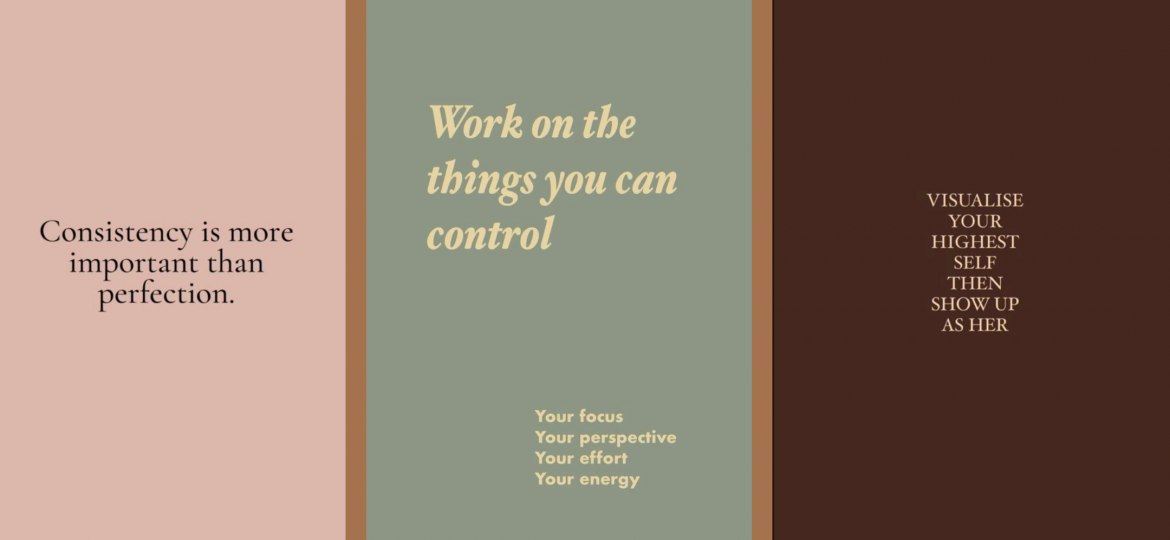
I’ve never been a fan of resolutions. The word in itself indicates that something needs fixing or that something is already wrong and needs to be addressed. See Oxford: the action of solving a problem, dispute, or contentious matter. Sure there are a couple of other meanings to it, but when we talk about “New Year, New Me,” it makes me feel like the “me” I am isn’t good enough to go into the new year. And that just didn’t sit well with me.
We’re nearly through Q1, and wherever you sit with your goals for the year, I see you. I know you’re trying and what you’ve achieved thus far is beautiful.
In 2023, a friend (hi, Alli Donovan!) and I sat down and laid out our “why’s” and our dreams and the habits needed to build to get there. 2024 was kind of my test year. There was a lot of readjustment and grace given. BUT I wasn’t trying to reinvent myself. I wasn’t trying to “become an unrecognizable version of myself.” I wasn’t trying to set myself up for failure by making goals that were only vaguely aligned with me (see goal from college, “have a defined six-pack”, literally, for why?).
Setting goals shouldn’t necessarily be about changing all that you are. For me (and this could be different for everyone, such as how you take your margarita rim – with sugar or salt or however you please), setting goals are about building upon who I am. Setting goals brings me closer to the person I aspire to be with the knowledge that she’s already here, she’s just warming up.
Setting Intentional Goals: A Holistic Approach
Setting goals is a powerful tool for personal growth and achievement. However, it’s important to approach goal setting with intention and ensure that the goals you set serve your highest self. This means aligning your goals with your values, passions, and long-term aspirations.
When I approach my goal setting, I’m looking at what my goals are and my why for each of them. There’s no bulk answering here. I make myself answer “Why am I choosing this goal?” for each one.
There are a million books that get into the fundamentals of goal setting, and I’m not a coach of any kind, and I’m not here to pretend I am. One common thread I’ve gleaned is the importance of building habits to make your goals come to life.
This can involve various tools and strategies to create a supportive and motivating environment for your habits and thus your goals. In the last two years, I’ve found these four tools to be really helpful: daily habit trackers, monthly bingo cards, friends for accountability, and quarterly reflections.
1. Daily Habit Trackers
This sounds asinine – I know. When I committed to building the life I want for myself, though, I knew I needed something. There’s plenty of psychology behind putting your money where your mouth is, so I threw down a whole $40 for the annual subscription to the Me+ Daily Planner App. For my girlies who love something cute, this was it – and for those who want to be 👏🏽 checking👏🏽 that👏🏽 ish👏🏽 off, this is also very much it. After six months, I had my habits down for my mornings. As I rolled into 2025, I did not renew my subscription, but I found another way to serve myself, and it’s very reminiscent of a chore chart.
We have a house calendar, and I created a key for two of my habits that are more frequent than others, and each day I do them, I pop a checkmark (for when I work out) and/or a very crude drawing of a sun (I don’t know why I didn’t pick an easier thing to draw, and now I’m committed). It gets me very excited in the morning to tag the calendar with my achievements, and it makes it very easy for me to go back and count how many days a week or for the full month I followed through! (AND it’s free!)
Building positive habits is crucial for long-term success. Daily habit trackers allow you to monitor and maintain your desired behaviors. Consistency is key, so focus on one or two habits at a time, be realistic about your habits, and allow yourself to achieve them.
2. Friends for Accountability
 Surrounding yourself with supportive friends can make a significant difference in your ability to achieve your goals. Find individuals who share your values and aspirations and who are willing to hold you accountable. You can establish a regular check-in schedule, whether weekly or monthly, to discuss your progress, challenges, and any necessary adjustments. I have a pal that I text and meet up with monthly then another mastermind group that meets every other month while sharing our wins in a group chat regularly.
Surrounding yourself with supportive friends can make a significant difference in your ability to achieve your goals. Find individuals who share your values and aspirations and who are willing to hold you accountable. You can establish a regular check-in schedule, whether weekly or monthly, to discuss your progress, challenges, and any necessary adjustments. I have a pal that I text and meet up with monthly then another mastermind group that meets every other month while sharing our wins in a group chat regularly.
It’s exciting to share in one another’s achievements and ask each other how we’re feeling / facing different challenges. Life is meant to be shared, when we win and when we need support. Accountability doesn’t have to be poking and probing, it can be encouraging and celebratory.

3. Monthly Bingo Cards
Be honest. If you have an annual bingo card, does Q1 go hard and then Q4 even harder? Because that’s how I would operate. I know myself, and I love a game, but I know if I have 365 days to win…I might let that game go until the final quarter.
Knowing that, I chose to lean into it and make monthly bingo cards. They play on my habits and my goals. This year, I am planning to win one grant, so each month, I have an “Apply for 1 grant” space because I’m working towards getting applications out there. Have fun with it! I included “Funsie book,” “Date night,” “Lift 15 pounds for one Rumble class,” and more boxes that make me excited to play. This visual representation of your progress can provide a sense of accomplishment, motivation, and plain fun!
4. Quarterly Reflections
Regular reflection is essential for assessing your progress, identifying areas for improvement, and celebrating your achievements. Additionally, it allows you to recognize if the goals are serving you. I’m looking at some of my bingo spaces and realizing that it does not make sense for me to have a space that says “Did not hit snooze for 31 days.” I am allowed to sleep in, I want to build a habit to get up when my alarm goes off, but that does not mean I need to do that every single day, every single month. SO after this quarter, I’m taking it off and adding something else that will serve me and further encourage me. And that’s okay. I’m learning better so I can do better – for me.
 Dedicate time each quarter to reflect on your goals. Consider questions such as:
Dedicate time each quarter to reflect on your goals. Consider questions such as:
- What progress have I made towards my goals?
- What challenges have I encountered, and how can I overcome them?
- Are my goals still aligned with my values and aspirations?
- What adjustments do I need to make?
Part of my quarterly reflection reflects my word for the year, building: What did I build this quarter? There have been numerous times throughout this year already that I can’t wait to journal about (and I am not a journaling girly pop!).
When you find habits and goals that excite you and pour into you while challenging yourself, your growth can look exponential from when you start (whenever you start–if you want to pivot or even start the ball now, you can!) Remember goal setting is meant to be experienced, not an immediate check on your list. Embrace the process, and be kind to yourself along the way.
SUPPORT LOCAL JOURNALISM
All of our content—including this article—is entirely free. However, we’d love it if you would please consider supporting our journalism with an Indy Maven Membership.
P.S. Sign up for our weekly newsletter with stories like this delivered to your inbox every Thursday!










